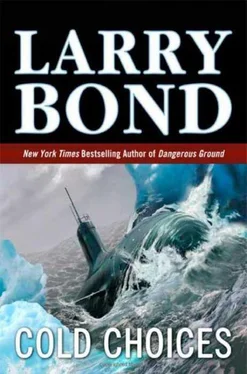Petr Velikiy
Vidchenko stood on the port bridge wing, binoculars fixed on an empty piece of water. It was pointless. A hundred other men watched that small spot of ocean as well, waiting for AS-34 to surface. In fact, it was redundant in the extreme, since the other watchers would all feel duty-bound to report a fact that the admiral had observed himself. Luckily, Kurganov received reports before he did, and filtered out the drivel.
A small splash and a bobbing orange and white shape were all that marked AS-34’s return to the surface. A whaleboat standing by started its engine and hurried toward the craft, which had appeared several hundred meters off Rudnitskiy’ s port side.
While the boat approached, Vidchenko saw a hatch open and someone appeared in the opening, waves lapping less than a meter below the opening.
The bridge-to-bridge radio crackled to life. “This is Bakhorin. The charges have been planted and tested. Everything is ready.”
Petr Velikiy’s captain, Chicherin, picked up the microphone to acknowledge the transmission, but Vidchenko suddenly walked over and held out his hand. Chicherin gave up the microphone and stepped back.
“This is Vidchenko. Well done, Captain Bakhorin. What is your battery charge?” Curiosity had overcome him, and he didn’t want to wait for their report.
“Four percent, sir. We opened the hatch because we needed some light inside.”
“Very well done. Join us in hoping now.”
Vidchenko hung up the microphone and turned to the underwater communications set.
Severodvinsk
The underwater communications station suddenly came to life. “Severodvinsk, this is Rear Admiral Vidchenko. Please respond.”
Kalinin reached the underwater telephone first. He acknowledged the transmission. “This is Captain Second Rank Kalinin, sir. Captain Petrov is with the injured men.” He waved frantically to a michman and gestured for him to hurry aft, toward the third compartment, where the casualties were being cared for. “He will be here soon.”
“Tell your Captain that we are ready to detonate explosive charges that will bring your submarine to an even keel. You must move everyone to the escape capsule immediately.”
“Sir, could you please repeat your last transmission?” Vidchenko patiently repeated his message almost verbatim. The admiral then added, a little impatiently, “Tell us the moment you are ready.”
“We will begin evacuation procedures immediately, sir. But it will take some time. We have wounded that must be carefully moved. We’ve had no warning, no time to prepare for this.”
Petrov came running into the central post in time to hear Vidchenko answer, “We did not want to give the Americans warning. We know they can monitor these communications. We will do our best to keep them from interfering with the rescue.”
Kalinin reported to his captain, “They are ready to free us. The Admiral says we must move everyone to the escape chamber immediately.”
Surprised, almost stunned, Petrov blinked at the news, paused a moment, then shrugged. He was puzzled by Vidchenko’s remark about the Americans, but that would keep. “Then let’s get moving, Starpom.” He turned to the rest of the men in the central post. “You heard the Admiral. Let’s go home.” He smiled, and it reflected off the faces of the men as they scrambled to their feet.
Kalinin started shouting orders. “Get the wounded in here, but move them gently.” He turned to a michman. “Get some rope to rig slings for them.”
Petrov picked up the microphone. “This is Captain Petrov, sir. We will move as quickly as possible. It will take some time, possibly over half an hour.” He hated to make that admission. The training standard was twenty minutes, but that was with a healthy crew.
Behind him, he heard men laughing, joking. They were going home! It was a surprise, but what a wonderful surprise to get. Kalinin pulled out a checklist from alongside the command console. Being good submariners, they’d planned what to do if the opportunity came to use the escape chamber. He handed the crew roster to his starshini michman, Senior Warrant Officer Zubov, who started crossing off names as men climbed the ladder from the central post into the chamber.
Petrov looked around the room, trying to run his own mental roster, when he realized that the chief engineer was missing. “Where’s Lyachin?” he asked, first to the starpom, then to the group. Nobody had an answer. The chief engineer was the next senior officer after Petrov and Kalinin. There were things he was responsible for and should already be here. It was impossible that he hadn’t heard the news. Where was he?
Petrov grabbed the shoulder of the nearest enlisted man. “Find the chief engineer and tell him to come here immediately. I don’t care what he’s doing.” He saw the expression on the man’s face, and reassured him. “Don’t worry, we won’t leave without you — or Lyachin.” The man hurried off.
Supervised by Dr. Balanov, the wounded started to arrive. A few were ambulatory, with broken arms or wrists, but many had leg injuries and had to be carefully carried through the narrow hatch between the third and second compartment. Their complaints and cries of pain were met with reassurances: “You’ll be in the hospital very soon.”
Petrov tried to keep clear of the confusion, but found himself organizing the transfer of the injured to the escape chamber. He’d managed to get several aboard when the starpom pulled him aside. Kalinin’s expression showed concern, even alarm, and beyond him, Petrov could see the sailor he’d sent looking for the engineer. He had the same expression.
“Sir, Captain Second Rank Lyachin is in the reactor compartment.” It was almost a formal report, and Petrov felt confused. There was nothing to do there. The reactor had been shut down immediately after the collision. It was as dead and safe as they could make it.
The enlisted man took a step forward. “Sir, I think you should go see him.”
“What? Now? He needs to get his ass up here!”
“Captain, please, I’ll take you to him.” The rating’s pleading only deepened Petrov’s concern, but carrying one of the American lanterns, he let himself be led past the confusion in the emptying third compartment, back through the fourth, the missile compartment, then through another hatch into the reactor spaces.
“He’s aft, sir, at the hatch into the auxiliary machinery spaces.” The man pointed down the dark passageway.
“What’s he doing there?” Petrov asked, half to himself, but the enlisted man left without saying another word.
The captain of Severodvinsk hurried down the dark passage, searching for his chief engineer. Walking quickly down the empty passageway, he finally found Lyachin right next to the watertight bulkhead, sitting on the deck, leaning against the hatch that led into compartment six. That compartment was now almost completely flooded, and automatically Petrov looked for signs of a leak. Is that what had drawn the engineer here, right now? There. In the lantern’s beam, he did see a few droplets of water glistening on the deck.
Lyachin didn’t acknowledge his commanding officer’s presence, and for a moment Petrov wondered if he was concentrating, absorbed in some task. But time was pressing. If there was a leak, it would be moot the moment they left the boat. “Sergey Vladimirovich, we are leaving. You are needed forward.”
“I’m needed here, too, sir. Captain, there are nine of my men back there. Four more in the port torpedo bay. I can’t abandon them.”
Petrov, astonished, was almost overcome by the depth of Lyachin’s grief. Out of courtesy, he hadn’t shone the lantern on the engineer’s face, but he could see now that Lyachin was freely weeping, tears falling onto the deck.
Читать дальше












